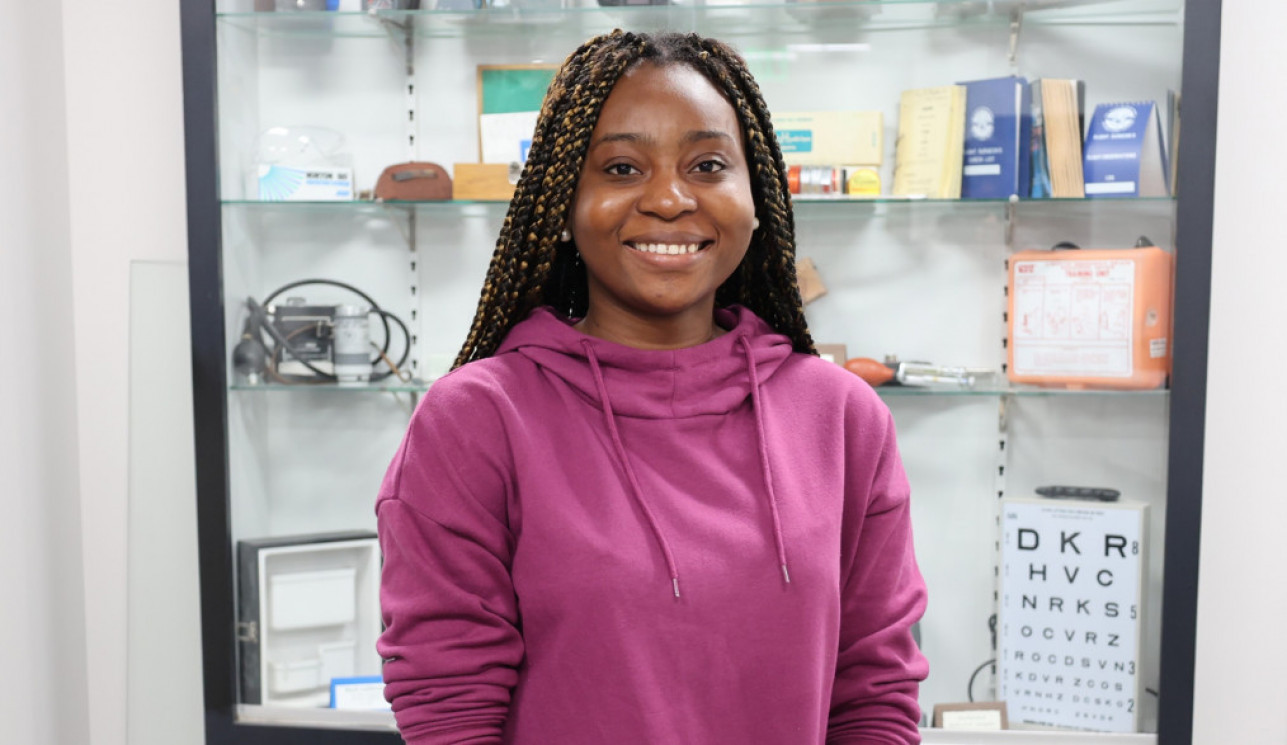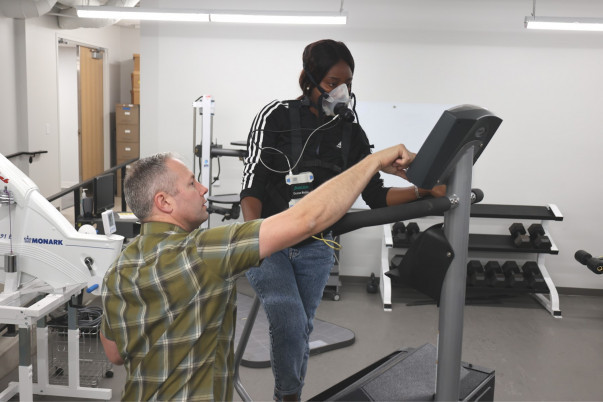Mubo Olufemi, from Nigeria, sees OEHS as a way to make a difference
By Bubba Brown

Mubo Olufemi, a PhD student from Nigeria, joined RMCOEH in 2022. She is pursuing a doctorate degree with the ultimate goal of returning to her home country to help build a culture of occupational safety and health. Photo: Charles Schuknecht
Nearly 3,500 miles from home, in a country that so little resembled her own, Mubo Olufemi experienced moments of doubt.
She had upended her life in Nigeria for this. She had left behind her family and friends. She had abandoned the promising career as a physical therapist that she had worked so hard to attain, doing so despite knowing it meant forgoing new opportunities in that field that were close to emerging.
But why?
It had not taken long for her to notice it when she began working as a physical therapist. The pattern never seemed to waver. So many of the patients she treated were there for the same reason, their injuries sharing an origin: They’d gotten hurt at work or as a result of their jobs.
The explanation wasn’t a mystery. In Nigeria, Olufemi said, careers in health care are prestigious. Becoming a doctor or a nurse or a physical therapist is a path to financial stability and esteem. Yet there are minimal regulations and infrastructure aimed at ensuring the health and safety of workers and preventing work-related injuries and fatalities. In fact, in all her years of school and work, she had never even met an occupational health professional.
“I was thinking about the fact that there had to be something (to help workers), because it can’t be like this in every other country,” she said.
She searched online and began to learn more about the ways in which workers in other countries are protected. She also discovered something that would set her on a new trajectory: Other countries have educational programs where she could gain the kind of knowledge and training that would enable her to push against the status quo in Nigeria.
“It was like, ‘Oh my God, I can do this,’” she said. “It sounded so interesting. I was like, ‘This is it.’”
Energized, Olufemi made one of the biggest decisions of her life, enrolling in a master’s degree program in occupational and environmental health and safety at the University of Galway in Galway, Ireland. She quit her job, even though she was on the verge of having enough tenure to advance her career through choosing an area within physical therapy to specialize in, and said goodbye to her loved ones.
The prospect of what the change meant, and where it might lead her, was invigorating. Yet charting a new path, she knew, would be difficult, and would be made even harder by doing it so far from home.
Many people in her life were supportive, but others questioned why she felt the need to leave Nigeria to pursue an education when she already had a successful career.
“For people who understood the bigger picture, they saw the passion and they saw the need for occupational health in Nigeria,” she said. “And they were like, ‘I think you’re doing the right thing. Go for it.’ But most people said, ‘I think you’re crazy.’”
There were times through the course of the program when the voices of the people doubting her decision seemed more clear than the voices of those supporting it. Occasionally, during challenging assignments, or when friends urged her to return home, the thought of quitting tugged at her mind.
But Olufemi, buoyed by her desire to make a difference, persevered. She returned home in 2021 — only once she had earned her degree.
“Somehow,” she said, “I made it.”
Back in Nigeria, though, she was quickly reminded why she wanted to study occupational health and safety in the first place. She was seeing the same kind of people, with the same kind of injuries, as before. If anything, it seemed like the situation was even worse than when she left.
She had planned upon her return to remain in Nigeria. But it was clear that she needed to do more. Armed with a renewed sense of purpose, she sought a job in Ireland to get the kind of professional experience that would be necessary to truly be part of the solution. COVID-19 lockdowns in Ireland scuttled those plans, however, so she began considering another possibility: returning, once again, to school and pursuing a doctorate degree.
“I decided that if I was going to do a PhD, I wanted to do it in a country that I feel is the champion of occupational health,” she said. She applied to two programs, both in the United States, including one located somewhere she’d never before heard of: Utah.
Mubo Olufemi, right, works with Dr. Matthew Thiese, the director of RMCOEH’s Occupational Injury Prevention program, in a lab at the center’s headquarters. Thiese says he has been impressed by Olufemi’s passion and is eager to see what she accomplishes at RMCOEH and once she graduates. Photo: Charles Schuknecht
She hoped that the state’s obscurity relative to places such as New York and California would mean reduced competition for admittance. Shortly after applying, she received a response from Matthew Thiese, the director of RMCOEH’s Occupational Injury Prevention program.
“I guess my strategy worked,” she said with a laugh.
A few months later, in the summer of 2022, Olufemi arrived in Salt Lake City, 7,468 miles from her hometown of Port Harcourt in southern Nigeria. She recently finished her first academic year as a PhD student in the Occupational Injury Prevention program.
To Thiese, it’s obvious: Olufemi has tremendous potential. Beginning with her pre-admittance interview and continuing through her time so far at RMCOEH, he has been struck by her openness to trying new things as well as the strength of her resolve. He is eager to not only see what she accomplishes at RMCOEH over the next few years but what she achieves once she graduates.
“You want to find students and work with them so they can go out and make the world a better place,” he said. “It’s a way to amplify your impact as well as their impact. A lot of the students I’ve had go on and do amazing things. Most of them are in the United States. When you think about where risks are to workers, the risks to workers in the United States are generally much lower for any kind of health or safety outcome as compared with other countries, particularly in Africa. So to have someone with Mubo’s passion, and her past experiences is exciting.”
For her part, Olufemi is still finding her footing in Utah. Salt Lake doesn’t yet feel like home — “I think that will take another year,” she said — and she misses Nigeria’s culture and its sense of community that fosters genuine connections between people, something she has found to be more rare in the U.S. Nonetheless, her experience at RMCOEH has been rewarding, and she sees the center as a pathway to possibility.
She tentatively plans to pursue research related to substance abuse among health care workers for her dissertation, and her goal is to complete her PhD in three more years. After that, she will return to Nigeria, though perhaps not immediately. Before she goes back, she wants to make sure she is prepared.
Seeds, in the meantime, are being planted. She said other Nigerians with similar passion for protecting workers are also schooling abroad. And she has heard of two schools in the country that have begun offering training in occupational health and safety, something that represents significant, if early, progress.
“I was so happy when I heard it,” she said. “… We can cause a ripple effect somehow.”
Even now, so much further down this path, the challenge ahead of Olufemi sometimes seems daunting. She is not immune from discouragement. It would have been easier to have stayed in Nigeria in the first place and progress in her physical therapy career.
But no longer does she wonder if she’s chosen the right path or feel a nagging pull to abandon what she’s started.
“There’s just this voice in my head that I’m actually doing the right thing, what I’m meant to be doing,” she said. “I wish I had made this decision sooner, when I was in my early 20s or something. But I’m here now and I’m very devoted to the cause.”




 © 2026 Rocky Mountain Center for Occupational and Environmental Health
© 2026 Rocky Mountain Center for Occupational and Environmental Health